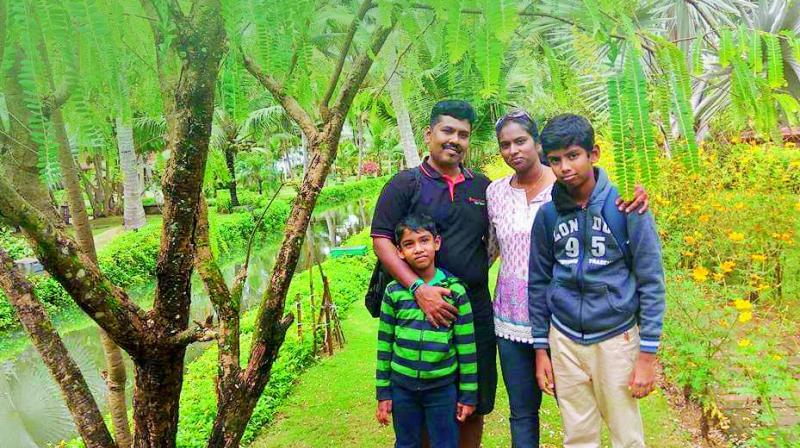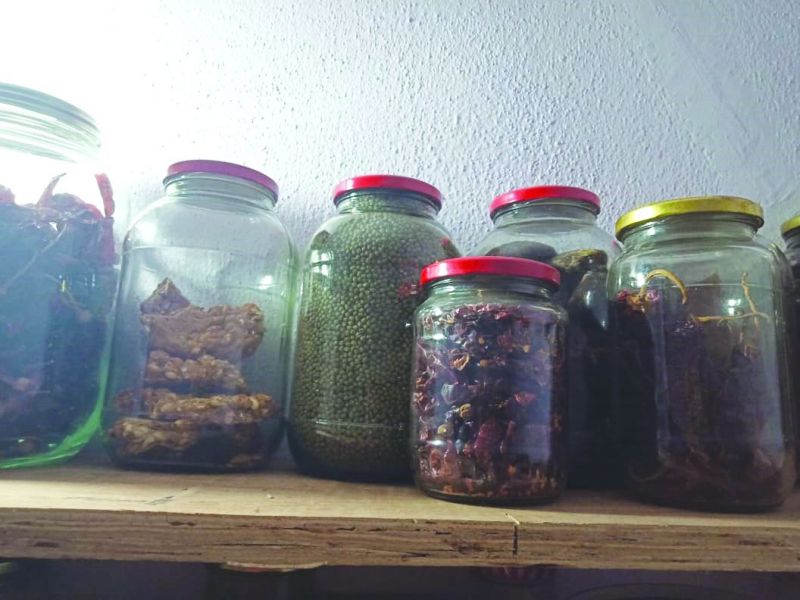Leading by example
Geetha, 39, of Bandlaguda Jagir is reducing the use of plastic, composting, saving water and spreading awareness.

As a student in 2003, Parashar Kumar realised he was generating more waste in a day at Jawaharlal Nehru University hostel than his mother did in a month at his village. The thought stuck with him.
Four years ago, Geetha Dinesh learnt that food and genetics were both responsible for learning difficulties in children while researching for her toddler who was showing early signs of the condition. The facts stayed with her.
For US-returned Rachita Agarwal, the taste of fruits and vegetables did not match the memory of the ones she had grown up eating. So she decided to act.
The catalysts were different but each of these individuals understood that the need to change and better the environment began with themselves.
And their efforts seem quite right — shrinking biodiversity; water, land and water pollution; deforestation; global warming; acid rain; urban sprawl; waste disposal; ozone layer depletion and climate change — the exploitation of our planet and degradation of our environment has reached an alarming rate.
We are also drowning in plastic — the United Nations Environment estimates that we produce around 300 million tonnes of plastic waste every year, which is equivalent to the weight of the entire human population.
Meanwhile, leading by example, Parashar, Geetha and Rachita explain what they do in their everyday lives to make a lasting difference.
 Rachita uses glass bottles to store edibles.
Rachita uses glass bottles to store edibles.
Change starts with self
33-year-old Parashar of Gachibowli, for example, has turned vegan, given up on packaged and processed foods, and stopped all non-essential air travels to reduce his carbon footprint. It was environmentalists like Rob Greenfield, who focuses on his actions rather than wait on the government for a change, that influenced him.
“I thought that if he can do it, why can’t I, as unlike the US, we still have our traditional markets. I have now eliminated almost 95% of plastic from my life,” he says, which means no fridge, no air conditioning, not even a washing machine, which he will shortly get rid of.
While some steps sound far-fetched, Parashar explains, “Just over 25 years ago, we managed well without plastics. I grew up in Saharsa, Bihar where the cooking oil was bought in tins, food in cloth bags and water stored in matkas. It really is not that difficult to go back if we try.”
The food he buys is either directly from the farmers or at the most, with one middleman, such as those at the organic markets at The Good Seeds First Sunday Mela at Saptaparni, Banjara Hills, Lamakaan or Our Sacred Space. Clothes are another issue. “It takes 2,700 litres of water to make one T-shirt and about 10,000 litres of water to cultivate just one kilogram of raw cotton. But NGOs such as Tula India and Sustainable Earth Foundation are perfectly good alternatives where the clothes are not only sustainable but are made with natural dyes, which do not cause cancer or pollute our waters,” says Parashar.
Composting for a better world
Geetha, 39, of Bandlaguda Jagir is reducing the use of plastic, composting, saving water and spreading awareness. “I read about disabilities in children being caused by genetics and the environment. While you can’t change genetics, I became very interested in the latter. What we are doing to the environment is coming back to haunt us,” she says, recalling that she first started her composting journey in 2016.
“I kept aside all my vegetable waste in a small pot and was thrilled when I saw my first compost harvest in my balcony,” says Geetha. The same year, her family shifted from a flat in Kondapur to their own house with a small garden. But the sight of the neighourhood shocked her — waste and litter covered the area.
“I would watch cattle feeding on them everyday and it was distressing. I started using Waste Ventures, a recyclable pickup service to collect my dry waste and recyclable products. I also found like minded people in my community, who started using it too,” she states.
Today, her community with 180 villas is segregating waste as well as building harvesting recharge pits to collect rainwater. “The initiatives have to be wide scale, and the need of the hour is awareness. Sadly, environment is still not a priority for most people, which is disheartening. They think leaving a home behind for the next generation is an asset but there is nothing more valuable than clean air, water and land. We borrow from our children, not our ancestors and if we can leave behind a good environment, nothing else matters,” says Geetha.
Stop the suppliers
Rachita of Secunderabad, who calls herself “homeless”, says her philosophy is to not own anything. After discouraging her father from leaving a home and money in her name, she now owns only a bicycle and lives on farms owned by her friends.
With a dry sense of humour, she adds, “I am moneyless, unmarried, and after the deaths of a few, I will have no close relatives. I do not have a 9-to-5 job and have no spending. I am free.”
Rachita grew up with nature, in a house surrounded by trees. While in Michigan, US, she loved backpacking and to be amidst nature. That’s when she got introduced to the Farmers Market and so, when she came back after 20 years in 2012, the food just did not taste the same.
“Looking around, I just saw truck loads of chemicals. You pull a thread and everything comes apart,” says Rachita, who adds, “It is very hard to remove plastic from our everyday lives, so the simplest thing is to stop the suppliers. It is simpler to stop some 20 suppliers of plastic bags than lakhs of consumers in Hyderabad from using them.”
Rachita was among a few that worked hard at Hyderabad Literary Fest 2018 to reduce their waste to nearly zero by mostly eliminating plastic at the venue. Personally, she only carries glass bottles or Mitticool products, uses cloth bags and stores food in glass or steel containers. She believes in not using anything that is harmful to the environment and uses khadi products and non-chemically dyed clothes; eats natural farm fruits and lives in buildings made with natural materials.
“I try to be as environmentally conscious as possible. It is really not that expensive to go organic. And there are lots of people who are acting and thinking along the same lines. Once you set your mind to it, you will find your tribe,” she adds.

